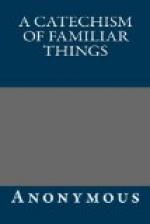Massive, bulky and heavy.
By whom was the Tower of Babel erected, and why?
By the descendants of Noe’s three sons, Sem, Cham, and Japheth; they were extremely numerous, and dwelt in the land of Sennaar; becoming ambitious of distinguishing themselves, they set about building a tower whose summit might reach to heaven. Sennaar was the original name of the country about Babylon.
Descendants,
those descended from a particular person or
family.
What remarkable event followed their foolish pride?
The Almighty suddenly frustrated their purpose by confusing their language and causing them all to express their words by different sounds; hence arose the numbers of different languages spoken by the nations of the earth; and thus what they imagined would be a monument of glory, was made an awful memento of their pride and folly.
Frustrated, prevented.
Monument, anything
by which the memory of persons or
things is preserved.
Memento, a hint
to awaken the memory of anything; that
which reminds.
What good effect did this event produce?
God, who at all times can bring good out of evil, by this means caused the other parts of the earth to be peopled; for this visitation having effectually broken up their scheme, they emigrated in parties, and dispersed themselves over different parts of the world.
Scheme, plan, intention.
Emigrated, removed from one country to another.
Dispersed, separated.
Where was Babylon?
This celebrated city, so often mentioned in Holy Writ, (and remarkable for the minuteness with which its destruction was foretold by the Prophets,) was the capital of the Assyrian Empire, and situated on the river Euphrates. After the destruction of Nineve, the ancient capital of this empire, Babylon became the most famous city of the East.
Minuteness, particularity.
What is meant by the Assyrian Empire?
The country of Assyria, in Asia.
For what was this city particularly celebrated?
For its hanging gardens, palaces, temples, and walls, the latter of which are said to have been three hundred and fifty feet high, and so broad that six chariots could go abreast upon them. The city was so strongly fortified, both by nature and art, as to be thought impregnable.
Fortified, defended.
Impregnable,
incapable of being taken or destroyed by an
enemy.
By whom was it destroyed, and when?
By Cyrus, 538 years before the birth of Christ, just
fifty years after
Nabuchodonosor had destroyed the city of Jerusalem
and its temple.
Who was Cyrus?
The founder of the Persian Empire.
Who was Nabuchodonosor?




